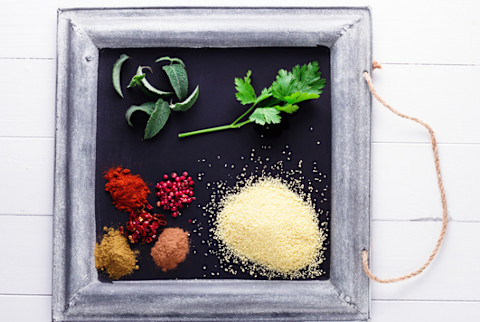
Looking for a new way to spice up your relationship? Look no further than Ayurveda, the 5,000-year-old medical science from India. Ayurveda has a beautiful way of explaining how our bodies interact with the universe around us, including how we interact with one another. Through the lens of this ancient system, we can view ourselves from a different perspective and learn how a few diet and lifestyle shifts can help to bring our bodies into a more harmonious state of being.
When we are balanced, we are able to achieve higher states of conscious living, enhancing our daily experiences and relationships—a strong libido and increased fertility rate is simply a by-product of living an Ayurvedically balanced life.
In addition to recommending simple diet, exercise, and lifestyle tips to increase libido and fertility, Ayurveda also offers some powerful herbal enhancements that can take our desires and abilities to the next level. Known as vajikaranas, this category of aphrodisiac herbs can not only help to bring stimulation to the reproductive organs but also deeply nourishes and replenishes the tissues of the organs:
Shatavari
1. Shatavari, or asparagus racemosus, is an Ayurvedic herb cherished for its abilities to rejuvenate the female reproductive system. Loosely translated as "one who possesses a hundred husbands," shatavari is an excellent tonic herb that has a lubricating and nourishing effect on tissues while helping to balance the female hormones and increase fertility. In traditional Ayurveda, the effects of Shatavari are enhanced when taken in powdered form with warm milk or cooked into ghee and eaten before meals.
Ashwaganda
2. Ashwaganda is also a powerful reproductive tonic herb and adaptogen from India. It is sometimes thought of as the male counterpart to Shatavari, as its benefits have a more specific action on the male reproductive organs, although both herbs can be safely enjoyed by both sexes. Ashwaganda is said to "give the vitality and sexual energy of a horse" and coincidentally also has a horse-like aroma (yum!). It is a highly valued rejuvenative herb widely used in Ayurveda as it has the unique ability to calm the nervous system while giving its recipient high amounts of energy and vitality.
Saffron
3. Saffron may be considered more of an exotic spice to most but is actually known to be a powerful aphrodisiac in India. A circulatory stimulant, it can bring blood flow into the reproductive organs and is even more powerful when combined with a reproductive tonic like shatavari or ashwaganda. Although it may be expensive, saffron is a delicious herb that will be sure to make your average weekday dinner a little more exciting.
Related reads:
